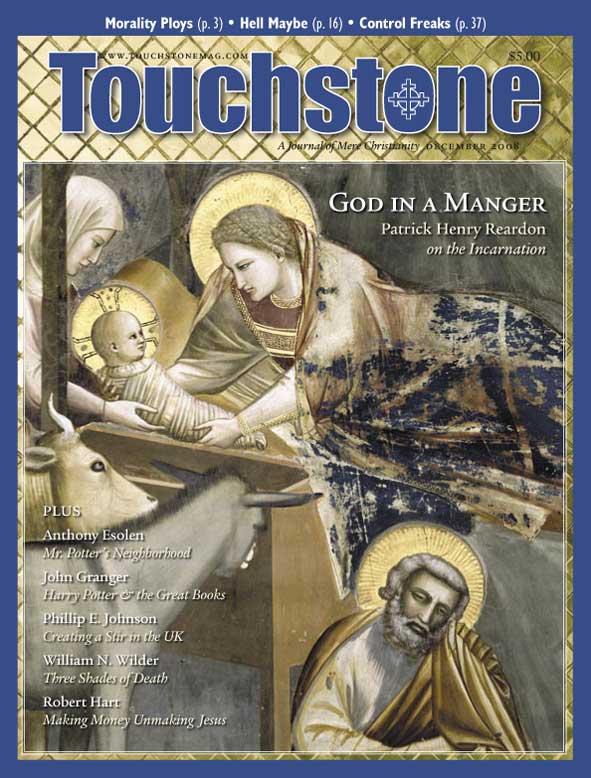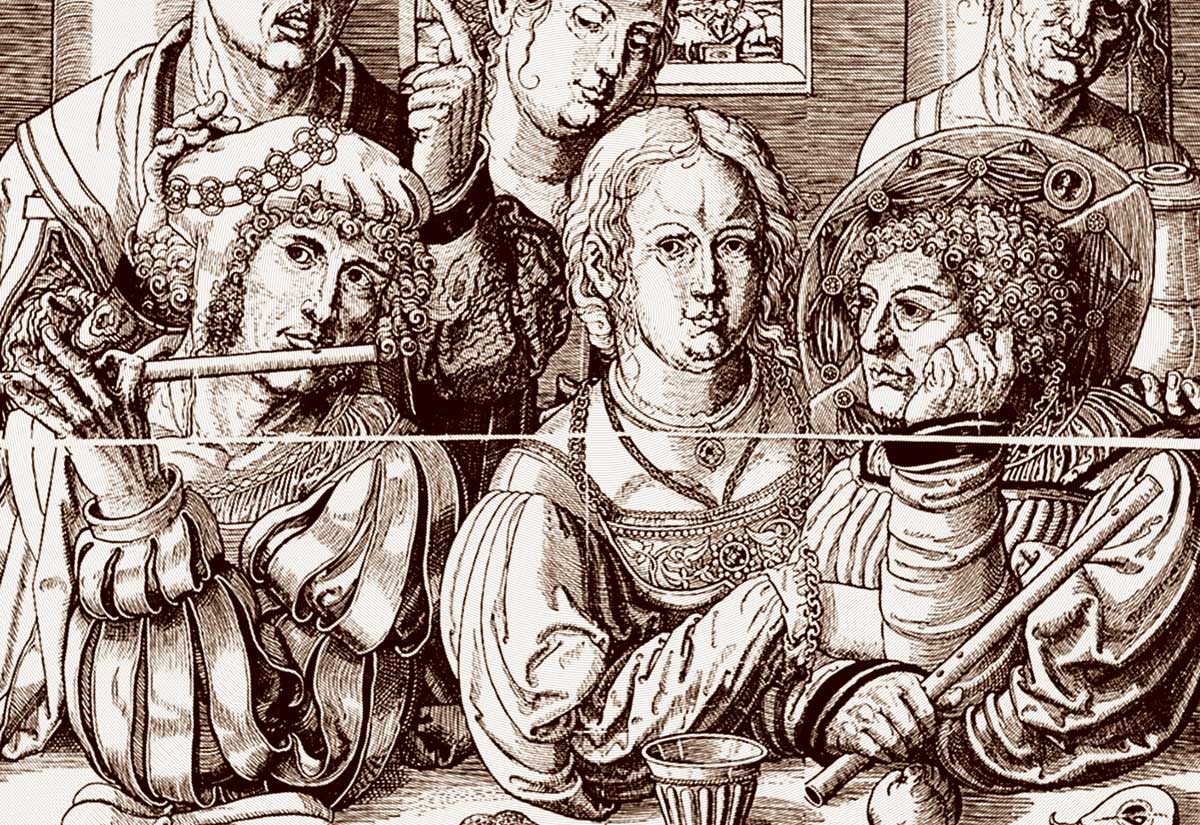View
Potterville Nation
Anthony Esolen on the Wonderful Life Most Think Impoverished
If you’re like my family, every year around Christmastime you sit down to watch It’s a Wonderful Life. It’s a film that failed when it first came out. Perhaps Frank Capra hadn’t brushed enough honey around the rim of the cup, because there is a bitter drug in that drink, bitter but healthful. Yes, an angel gets his wings, and the cast breaks out into a rousing chorus of Hark, the Herald Angels Sing, and Jimmy Stewart croons a few off-key bars, homely and ordinary and believable. But beneath it all lies the bare truth.
Our lives seldom attain to any glory, not here. Only a few men can be war heroes, like Harry Bailey, or business magnates, like Sam Wainwright. The rest of us, just about everybody, will face the choice that the protagonist, George Bailey, faced all his life. We may recognize the duties that bind us to this spouse, these children, these neighbors, this family history, this utterly ordinary place called Bedford Falls, or we may go our own way, and pursue those objects of appetite that we commonly call “our dreams.”
Recall that the two most important events in the lad’s life are shaded with tragedy. George is a high-spirited and responsible boy. He saves his brother from drowning in an icy pond, and loses his hearing in one ear because of it. He saves his employer, the druggist Mr. Gower, from committing accidental homicide. The old man receives a telegram from the army notifying him that his son has died in battle, and he quietly drinks himself into a stupor in the back room. George notices the telegram, says nothing about it, notices too that Mr. Gower is not himself, says nothing about that, and then notices that the druggist has absent-mindedly put poison into someone’s prescription bottle. Then he does speak up, and Mr. Gower begins to thrash him for it. “Don’t hit me on my sore ear, don’t hit me on my sore ear!” he cries, just before the man comes to his senses.
It is a terrible moment. And overhearing it at the counter are two little girls who have a crush on George. One of them will be responsible for killing his dreams to go on adventures to explore far-off places like Tahiti. That girl, Mary, will become his wife.
A Significant Life
For George, red-blooded American boy, has big dreams. He doesn’t like the cramped little town he was born in. He isn’t interested in taking over the family business, the shoestring Building and Loan, run by his father and his incompetent Uncle Billy. He grows up and is ready to go. In fact he has his jalopy packed when the news comes to him that his father has died. The Building and Loan will not survive—the board of trustees will turn it over to the ruthless entrepreneur, Mr. Potter—unless George agrees to take his father’s place.
He does not want that job, but he is the only man who can fill it, and he understands that a great deal depends upon the independence of the Building and Loan. That is because the Baileys had determined that their business was more than business. They would lend money to people who could not get credit elsewhere, literally banking on a man’s reputation for hard work, clean living, and raising a decent family. They made it possible for other people to build, to enjoy their own small shops, their own homes. Perhaps it’s not much of a dream, to have a well-tended little house with a room set aside for tailoring, but it is for the fulfillment of those small necessities of other people’s lives that George gives up the unnecessary dreams of his.
Even his marriage to Mary, who has grown into a warmhearted and lovely woman, partakes of this sacrifice. She is a homebody, hardly likely to win George over. Her dream is to buy a shambling old Victorian house down the road and fix it up a little, restoring to it a little of its original handsomeness. The stairs are creaky, the windows are drafty, and the newel on the banister keeps coming off when you grab hold of it, but Mary loves it anyway. And there, were it not for a remarkable series of mishaps and some divine intervention, George Bailey would have lived out his days in obscurity and contentment and some lingering sense of glory missed, forever.
Most of my readers will recall the disaster that threatens to bankrupt the Building and Loan and send George to prison. I’ll only note that when George stands on the bridge, ready to throw himself into the river and die, he is once again on the verge of leaving, this time for good. He is prevented, of course, by the amiable angel Clarence, whom he rescues from the river instead; again, giving up a dream for the sake of someone else.
Clarence will show him that his life has been significant. If he had not lived, his brother Harry would have died. All the men whom his brother saved on their sinking ship would also have died. Mary would never have blossomed; she would have sunk to the life of a lonely librarian, a spinster. The other girl at the druggist’s would have become a streetwalker. Mr. Gower would have lost his business, having poisoned his patient, and become a loathsome, homeless drunk. Worst of all, Bedford Falls would have become Potterville. More about that in a moment.
An Accusing Movie
What Clarence says is true enough. But suppose George had lived, and had gotten into the habit of leaving the scene. You don’t have to travel far to absent yourself. All it takes is a small turn of the will, imperceptible to everyone but God. Suppose George had hesitated a moment or two when his brother fell through the ice. Suppose he had not paid attention to Mr. Gower. Suppose he had said to himself, “That’s not my business.” Suppose he had allowed himself a deceitful fling with Mary, and no more. Suppose he had sighed and said, “It’s too bad about my father, but I have my own life to live.” Bedford Falls would have become Potterville, just the same.
Perhaps that is what those first audiences saw in the movie.
For despite the popularity It’s a Wonderful Life now enjoys, that movie accuses us Americans with the vehemence of a Jeremiah. Its message is not simply that every life is important, but that what makes my life important, in the long view, in the providential view, is almost always what the world considers silly, small-town, no-account, trivial—a waste.
Frank Capra was not predicting that Bedford Falls would become Potterville. He saw the process well underway. We Americans have been making the other choice for decades. More than that, we have preached as loudly as we can that it is the only choice to make, for progress, self-fulfillment, the gross domestic product, and other chimeras. We hate Mr. Potter, but we sure do like Potterville.
What is the town like, when its ruling spirit is the universal wolf of avarice—not simply the desire to hoard up money, but rather the desire to have, have, have: big houses, glitzy bars, strong drink, lots of customers, hot sex, a fancy nameplate on the desk, diplomas on the wall, expense accounts, designer children, importance? We see it in that nightmare time when George is led by the angel, who shows him what would have been without him, which is nothing less than the loss of community itself.
With that loss of community, the ordinary virtues that sweeten our pilgrimage to the grave are stunted. The cops are not good fellows, but sarcastic and surly. Mary is withdrawn and isolated. Her sexy rival at the soda fountain is hardened by the men she loves and hates. Nick, who in Bedford Falls made a pleasant enough bartender, now owns the place, and his seamy and violent side shows through. Potterville is loud, crass, bustling, rich, and mad.
Life in Potterville
It is, of course, where we now live. I make no special claim to holiness here. I live in Potterville too, and have helped to make it what it is. But I do notice it. Potterville is a place of abandonment.
We form romantic attachments, we play house. Then we break the attachments, and abandon the house. No harm done, except to our capacity to love, and to cleave only unto one person, till death do us part. We marry, and have children, and abandon the children to the care of strangers. We leave town, not to become a citizen of another town, but to become a citizen of no town at all, and abandon the work of local government to a few meddlers nearby and an army of bureaucrats from far away.
We pass by the checkout counter in the grocery store and see old ladies buying pornographic magazines that would have made any decent man blanch years ago, and we say and do nothing, because it has long ceased to be our business. Mass entertainment has degraded minds and souls everywhere, and we sigh, and say that it has always been that way, although something tells us that our grandfathers and grandmothers made their own entertainment, with their kin and their neighbors. But those cultural habits have been abandoned, too.
And what do St. Peter’s and the First Baptist Church and the United Church of Christ, Potterville, do about it? They meet the people of Potterville where they are. Since Potterville is a place of abandonment, the churches follow suit, and abandon their mission. That makes everybody happy. The people of Potterville want to divorce, dispose of their children, and follow their dreams. So the churches avert their eyes, demurely, when their parishioners divorce—for the churches are old ladies in lavender, and must observe certain proprieties. They fairly encourage the people to dispose of their children. Doctrine? Catechism? Confessions? Preaching must submit to the times: the Potterville Times.
The True Pilgrimage
As for following our dreams, or what Scripture calls the vain imaginations of the heart, the churches have enlisted God himself in that service. Last year I was asked to give a commencement address to homeschooled seniors. At the beginning of the evening, the pastor of the church we were using, a young man in blue jeans with his shirt hanging out, gave the blessing. He instructed the young people to dream big, because God “has dreams about you that are bigger than any you can imagine.” All worldly dreams, too. He who would avoid becoming the chump and slave of his brothers, must become their master. Except you become as potentates. Redeem the time, because the night cometh, wherein no man can strut.
Yes, we are to use the gifts God has given us, but how, and where, and for what purpose, and for whom? George Bailey might have made a terrific adventurer. God wanted him instead to be a fair-to-middling businessman in a small town. He had gifts to give there, too, but not ones that help you garner fame. He had humility, forbearance, and a greathearted capacity for sacrifice. Those are what make George what his brother calls him, “the richest man in town,” because they place him at the heart of that village which has broken his heart so often, but which he loves anyway.
No, Bedford Falls cannot satisfy. Nor can your spouse, your children, your neighbors, your body, your anything on earth. But what do we seek, leaving and leaving again? Consider it, next time you are in the Potterville International Airport, to be found wherever planes depart. For Potterville Airport is a peculiar place in this regard, as George Bailey learned, though he had to suffer to learn it. All its planes come from Potterville, and land in Potterville. He who would valiant be, let him turn to the ordinary business at hand. The true pilgrimage is here. •
Anthony Esolen is Distinguished Professor of Humanities at Thales College and the author of over 30 books, including Real Music: A Guide to the Timeless Hymns of the Church (Tan, with a CD), Out of the Ashes: Rebuilding American Culture (Regnery), and The Hundredfold: Songs for the Lord (Ignatius). He has also translated Dante’s Divine Comedy (Random House) and, with his wife Debra, publishes the web magazine Word and Song (anthonyesolen.substack.com). He is a senior editor of Touchstone.
subscription options
Order
Print/Online Subscription

Get six issues (one year) of Touchstone PLUS full online access including pdf downloads for only $39.95. That's only $3.34 per month!
Order
Online Only
Subscription

Get a one-year full-access subscription to the Touchstone online archives for only $19.95. That's only $1.66 per month!
bulk subscriptions
Order Touchstone subscriptions in bulk and save $10 per sub! Each subscription includes 6 issues of Touchstone plus full online access to touchstonemag.com—including archives, videos, and pdf downloads of recent issues for only $29.95 each! Great for churches or study groups.
Transactions will be processed on a secure server.
more from the online archives
calling all readers
Please Donate
"There are magazines worth reading but few worth saving . . . Touchstone is just such a magazine."
—Alice von Hildebrand
"Here we do not concede one square millimeter of territory to falsehood, folly, contemporary sentimentality, or fashion. We speak the truth, and let God be our judge. . . . Touchstone is the one committedly Christian conservative journal."
—Anthony Esolen, Touchstone senior editor










